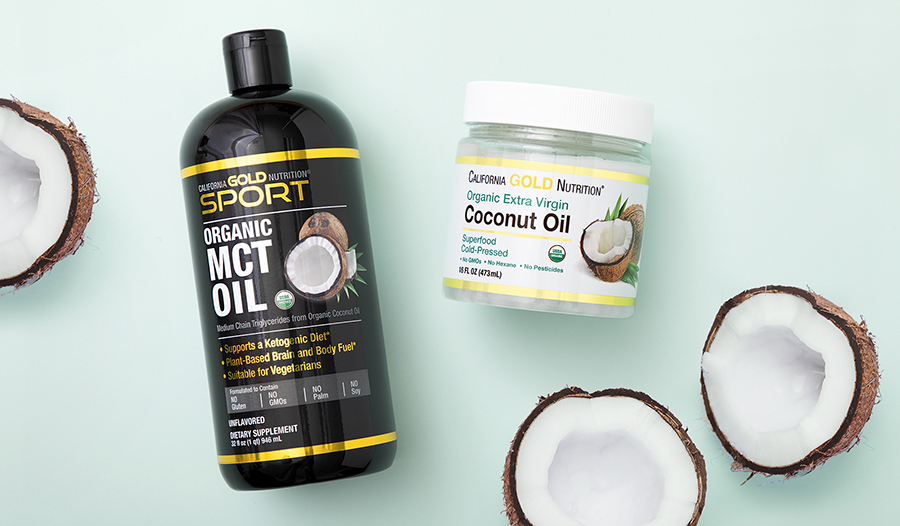MCT Oil vs. Coconut Oil: What’s the Real Difference

Both coconut oil and medium-chain triglyceride (MCT) oil are popular supplements to support health. And while they have some similarities, they also have some significant differences.
What Is Coconut Oil?
Coconut oil is the easiest to explain: it's the oil derived from coconuts. However, it is worth recognizing that there are different types of coconut oil, from minimally processed, cold-pressed virgin coconut oil to refined or even hydrogenated coconut oil. Virgin coconut oil is typically considered to be coconut oil derived from mature coconuts. The oil is extracted through mechanical or other "natural" means. Heat might be applied, but the resulting oil is not refined.
Refined coconut oil is often extracted from coconuts through harsher techniques, which can include the use of toxic chemical solvents. Once the oil is collected, it is refined, bleached, and deodorized. While not a perfect test, virgin coconut oil typically has a characteristic coconut smell and taste. In contrast, refined coconut oil has little scent or flavor, yielding a mostly flavorless off-white oil. Additionally, virgin coconut oil is much higher in phenolic compounds—antioxidant compounds found in numerous popular herbal products, including chocolate, green tea, blueberries, and pine bark extract. Generally, phenolics have antioxidant and anti-inflammatory properties.
As far as oil content goes, coconut oil is over 90% saturated fat. Of these fats, a large percentage are medium chain triglycerides (MCTs). The structure of a fat molecule includes a backbone with fatty acid chains that extend from the backbone. These fatty acid chains can vary in length and structure, giving them different properties. Generally, MCTs have between six and twelve links in their chain. On average, coconut is composed of around 60% MCTs, with the remainder being long-chain triglycerides. Palm kernel oil is the only other common food oil that contains significant MCTs, containing around 50%.
What Is Medium Chain Triglyceride (MCT) Oil?
MCT oil is refined coconut or palm kernel oil that strips out the long-chain triglycerides, leaving behind the medium-chain fats. Products can vary based on the percentage of the different types of MCTs. The main medium-chain triglycerides include:
- Caproic acid with six carbon chain links
- Caprylic acid with eight carbon chain links
- Capric acid with ten carbon chain links
- Lauric acid with twelve carbon chain links
Both coconut oil and MCT oil are sources of medium-chain triglycerides, which have interesting effects on the body however they are not the same. MCT oil is just a more concentrated and refined version of MCTs as compared to coconut oil. However, in MCT products, lauric acid is sometimes removed because it acts similar to longer-chain fatty acids. Similarly, caproic acid is often removed because it is more likely to cause digestive upset for some individuals.
Based on the latest research, there are good reasons for so much interest in supplementing MCTs. Due to their structure, MCTs have unique properties: they are primarily utilized as an alternative fuel source. While other, long-chain fats can be stored in the body, MCTs are readily available to be burned for energy production. This process, called ketosis, is usually only accessible by eating a low carbohydrate diet or fasting. However, when added to the diet, MCTs are a simpler way of acquiring some of the benefits of using fats as a direct alternative energy source. When consumed, MCTs increase ketosis throughout the body.
The Elephant in the Room: Coconut Oil, Saturated Fat, and Heart Disease
First and foremost, it's worth addressing the largest concern around coconut oil. Since coconut oil is mainly saturated fat, many experts recommend against consuming coconut oil due to the potential risks of increased heart disease. While more data would be helpful, the available research does not suggest that coconut oil increases heart disease risk.
A meta-analysis in 2010 concluded that no evidence existed to support a link between dietary saturated fat and heart disease. A more recent meta-analysis compared replacing saturated fat with polyunsaturated fat and found no change in heart disease risk. A 2019 review article concluded that the American Heart Association's stance on the evidence for reducing saturated fat to reduce heart disease risk is overstated and needs re-evaluation.
While it is clear that coconut oil raises both good and bad cholesterol, the effects do not appear to raise heart disease risks. Studies of populations consuming larger quantities of coconut and coconut oil have not shown increased risk for heart disease. Based on the evidence that suggests saturated fat does not induce heart disease and that coconut consumption does not raise heart disease risks, it appears likely that coconut oil does not harm heart health. However, more research would still be useful to further our understanding and help confirm the current evidence.
Benefits of Coconut Oil
May Aid Weight Management
While the evidence for weight management from coconut oil is mixed, there are some situations where coconut oil supplementation may provide advantages. A study in adults with heart disease who lost weight over three months maintained their weight management when given a diet that included coconut oil compared to a diet without.
Several studies exploring coconut oil supplementation combined with EGCG, a green tea extract, have shown benefits. In multiple sclerosis patients, the combination was found to increase fat loss, improve the waist-hip ratio and decrease body mass index. Inflammation was decreased by the combination as well.
Several studies in overweight women have also suggested that coconut oil might reduce abdominal fat, the dreaded "spare tire" of fat around the middle. However, it is worth noting that a study of coconut oil treatment for obesity in men found no benefits, although they also used one of the lowest doses of coconut oil of any of the studies—just one tablespoon per day.
May Improve Cognitive Function Impaired By Alzheimer's Disease
Alzheimer's disease, at its core, appears to be a problem with energy metabolism in the brain. Based on this understanding, Alzheimer's disease has been described as diabetes type 3 with impaired brain glucose metabolism. One possible workaround is supplying an alternative fuel source. Both coconut oil and MCT oil can provide fats that the brain can utilize directly for fuel, bypassing glucose metabolism.
Studies giving patients with Alzheimer's disease coconut oil have shown improved cognitive function. One study compared coconut oil plus a healthy Mediterranean diet to just a Mediterranean diet alone. Improvements in different types of memory with coconut oil supplementation were notable. Interestingly, women with mild to moderate dementia responded best, although other groups also displayed improvements.
A separate study on Alzheimer's patients supplemented coconut oil over 21 days and found cognition benefits. Improvements in orientation and language construction reached significance. However, not all studies on coconut oil and Alzheimer's have found benefits. A study on coconut oil in Alzheimer's patients did not find cognitive improvements. Of note, a large percentage of patients dropped out of the study due to diarrhea from the intervention, which may have confounded the results. While the study started with 41 patients, only eight completed the six-month course of treatment in the coconut oil group.
Benefits of MCT Oil
Not surprisingly, some of the same benefits seen with coconut oil have also been explored with MCT oil.
May Aid in Weight Management
A study compared MCT oil to long-chain fat consumption over 12 weeks. Subjects consuming the higher MCT oil diet lost 8.5 pounds as compared to 6 pounds on the diet containing long-chain fats. Other studies have shown similar results, with greater weight management in subjects consuming MCT oil as compared to other, more standard types of fat.
MCT oil also appears to increase satiety or fullness after meals, potentially helping with reduced calorie consumption. In addition, the oil appears to increase fat utilization for energy, improving energy production and calorie usage. Both effects may also be helpful for weight management. Compared to coconut oil, the data on MCT oil for helping with weight management appears to be a bit more robust. A review of the research even concluded that MCT oil might facilitate weight control when used to replace long-chain fats.
May Improve Cognitive Function For Those With Dementia
As we get older, frailty and memory loss are of increasing concern. In elderly individuals, early evidence suggests that supplementation with MCT oil can help to maintain weight and muscle mass. A separate small study on frail nursing home residents found similar results. The residents given MCT oil had improvements in muscle strength and daily functioning.
And similar to coconut oil, data also suggests the benefits of MCT oil for cognitive function. A recent meta-analysis of studies on MCT oil and dementia included 422 participants. The administration of MCT oil was shown to induce a mild state of ketosis. In addition, MCT oil was found to improve cognitive function when assessed through either of two cognitive function evaluations. Between coconut oil and MCT oil for improving cognition in dementia patients, the published evidence is stronger for the benefits of MCT oil. Based on what's known, it's not surprising that MCT oil is being seen as having potential anti-aging benefits and as a support for potentially increasing longevity.
Which is Better? MCT Oil or Coconut Oil?
Coconut oil and MCT oil are both sources of medium-chain fats that can help induce a state of ketosis. While the evidence is more robust for MCT oil, they both appear to have potential applications for improving cognition, dementia, and weight management based on the research. However, the research on MCT oil is a bit more robust in suggesting actual benefits in human clinical trials.
References:
- Assunção ML, Ferreira HS, dos Santos AF, Cabral CR Jr, Florêncio TM. Effects of dietary coconut oil on the biochemical and anthropometric profiles of women presenting abdominal obesity. Lipids. 2009;44(7):593-601. doi:10.1007/s11745-009-3306-6
- Avgerinos KI, Egan JM, Mattson MP, Kapogiannis D. Medium Chain Triglycerides induce mild ketosis and may improve cognition in Alzheimer's disease. A systematic review and meta-analysis of human studies. Ageing Res Rev. 2020;58:101001. doi:10.1016/j.arr.2019.101001
- Benlloch M, Cuerda Ballester M, Drehmer E, et al. Possible Reduction of Cardiac Risk after Supplementation with Epigallocatechin Gallate and Increase of Ketone Bodies in the Blood in Patients with Multiple Sclerosis. A Pilot Study. Nutrients. 2020;12(12):3792. Published 2020 Dec 10. doi:10.3390/nu12123792
- Cardoso DA, Moreira AS, de Oliveira GM, Raggio Luiz R, Rosa G. A COCONUT EXTRA VIRGIN OIL-RICH DIET INCREASES HDL CHOLESTEROL AND DECREASES WAIST CIRCUMFERENCE AND BODY MASS IN CORONARY ARTERY DISEASE PATIENTS. Nutr Hosp. 2015;32(5):2144-2152. Published 2015 Nov 1. doi:10.3305/nh.2015.32.5.9642
- Chan SC, Esther GE, Yip HL, Sugathan S, Chin PS. Effect of cold pressed coconut oil on cognition and behavior among patients with Alzheimer’s disease - A pilot intervention study. Nat J Physiol Pharm Pharmacol. 2017;7(12):1-4.
- De la Rubia Ortí JE, Sánchez Álvarez C, Selvi Sabater P, et al. Influencia del aceite de coco en enfermos de alzhéimer a nivel cognitivo [How does coconut oil affect cognitive performance in alzheimer patients?]. Nutr Hosp. 2017;34(2):352-356. Published 2017 Mar 30. doi:10.20960/nh.780
- Deen A, Visvanathan R, Wickramarachchi D, et al. Chemical composition and health benefits of coconut oil: an overview. J Sci Food Agric. 2021;101(6):2182-2193. doi:10.1002/jsfa.10870
- Hamley S. The effect of replacing saturated fat with mostly n-6 polyunsaturated fat on coronary heart disease: a meta-analysis of randomised controlled trials. Nutr J. 2017;16(1):30. Published 2017 May 19. doi:10.1186/s12937-017-0254-5
- Heileson JL. Dietary saturated fat and heart disease: a narrative review. Nutr Rev. 2020;78(6):474-485. doi:10.1093/nutrit/nuz091
- Jadhav HB, Annapure US. Triglycerides of medium-chain fatty acids: a concise review [published online ahead of print, 2022 Jun 22]. J Food Sci Technol. 2022;1-10. doi:10.1007/s13197-022-05499-w
- Kasai M, Nosaka N, Maki H, et al. Effect of dietary medium- and long-chain triacylglycerols (MLCT) on accumulation of body fat in healthy humans. Asia Pac J Clin Nutr. 2003;12(2):151-160.
- Lipoeto NI, Agus Z, Oenzil F, Wahlqvist M, Wattanapenpaiboon N. Dietary intake and the risk of coronary heart disease among the coconut-consuming Minangkabau in West Sumatra, Indonesia. Asia Pac J Clin Nutr. 2004;13(4):377-384.
- Mancini A, Imperlini E, Nigro E, et al. Biological and Nutritional Properties of Palm Oil and Palmitic Acid: Effects on Health. Molecules. 2015;20(9): 17339-17361. Published 2015 Sep 18. doi:10.3390/molecules200917339
- Marina AM, Che Man YB, ManabI. Amin I. Virgin coconut oil: emerging functional food oil. Trends Food Sci Technol. 2009;20(10):481-487.
- Nimbkar S, Leena MM, Moses JA, Anandharamakrishnan C. Medium chain triglycerides (MCT): State-of-the-art on chemistry, synthesis, health benefits and applications in food industry. Compr Rev Food Sci Food Saf. 2022;21(2):843-867. doi:10.1111/1541-4337.12926
- Oliveira-de-Lira L, Santos EMC, de Souza RF, et al. Supplementation-Dependent Effects of Vegetable Oils with Varying Fatty Acid Compositions on Anthropometric and Biochemical Parameters in Obese Women. Nutrients. 2018;10(7):932. Published 2018 Jul 20. doi:10.3390/nu10070932
- Platero JL, Cuerda-Ballester M, Ibáñez V, et al. The Impact of Coconut Oil and Epigallocatechin Gallate on the Levels of IL-6, Anxiety and Disability in Multiple Sclerosis Patients. Nutrients. 2020;12(2):305. Published 2020 Jan 23. doi:10.3390/nu12020305
- Prior IA, Davidson F, Salmond CE, Czochanska Z. Cholesterol, coconuts, and diet on Polynesian atolls: a natural experiment: the Pukapuka and Tokelau island studies. Am J Clin Nutr. 1981;34(8):1552-1561. doi:10.1093/ajcn/34.8.1552
- Siri-Tarino PW, Sun Q, Hu FB, Krauss RM. Meta-analysis of prospective cohort studies evaluating the association of saturated fat with cardiovascular disease. Am J Clin Nutr. 2010;91(3):535-546. doi:10.3945/ajcn.2009.27725
- St-Onge MP, Jones PJ. Greater rise in fat oxidation with medium-chain triglyceride consumption relative to long-chain triglyceride is associated with lower initial body weight and greater loss of subcutaneous adipose tissue. Int J Obes Relat Metab Disord. 2003;27(12):1565-1571. doi:10.1038/sj.ijo.0802467
- St-Onge MP, Jones PJ. Physiological effects of medium-chain triglycerides: potential agents in the prevention of obesity. J Nutr. 2002;132(3):329-332. doi:10.1093/jn/132.3.329
- Tsuji H, Kasai M, Takeuchi H, Nakamura M, Okazaki M, Kondo K. Dietary medium-chain triacylglycerols suppress accumulation of body fat in a double-blind, controlled trial in healthy men and women. J Nutr. 2001;131(11):2853-2859. doi:10.1093/jn/131.11.2853
- Vogel CÉ , Crovesy L , Rosado EL , Soares-Mota M . Effect of coconut oil on weight loss and metabolic parameters in men with obesity: a randomized controlled clinical trial. Food Funct. 2020;11(7):6588-6594. doi:10.1039/d0fo00872a
- Watanabe S, Tsujino S. Applications of Medium-Chain Triglycerides in Foods. Front Nutr. 2022;9:802805. Published 2022 Jun 2. doi:10.3389/fnut.2022.802805
- Xue C, Liu Y, Wang J, et al. Consumption of medium- and long-chain triacylglycerols decreases body fat and blood triglyceride in Chinese hypertriglyceridemic subjects. Eur J Clin Nutr. 2009;63(7):879-886. doi:10.1038/ejcn.2008.76
- de la Rubia Ortí JE, García-Pardo MP, Drehmer E, et al. Improvement of Main Cognitive Functions in Patients with Alzheimer's Disease after Treatment with Coconut Oil Enriched Mediterranean Diet: A Pilot Study. J Alzheimers Dis. 2018;65(2):577-587. doi:10.3233/JAD-180184
- de la Rubia Ortí JE, Platero JL, Yang IH, et al. Possible Role of Butyrylcholinesterase in Fat Loss and Decreases in Inflammatory Levels in Patients with Multiple Sclerosis after Treatment with Epigallocatechin Gallate and Coconut Oil: A Pilot Study. Nutrients. 2021;13(9):3230. Published 2021 Sep 16. doi:10.3390/nu13093230
DISCLAIMER:This Wellness Hub does not intend to provide diagnosis...
















































































 Table of Contents
Table of Contents















